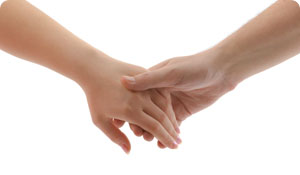
We depend on family and friends to fill some of our needs for love, companionship, and security. A healthy dependency is a two-way relationship; both parties contribute to it in positive ways. A codependent relationship, in contrast, is an unhealthy, dysfunctional, perhaps even abusive, one-sided relationship.
Mental health experts first coined the term codependency to describe the relationship between someone with a substance abuse problem and another person (usually a family member) who enables the first person to continue their negative behavior. The classic example is the spouse who makes excuses for her partner's drinking or physical abuse, rather than leaving or demanding a change.
Today we use codependence more broadly to describe relationships in which one party has an exaggerated sense of responsibility for the other, at the expense of his own values and sense of self worth. The codependent person is heavily dependent upon the relationship, despite the dysfunction, and fears abandonment or rejection.
Individuals generally learn codependency as children by watching others in codependent relationships. As adults, they may stumble from one codependent relationship to the next. In each relationship, they are always the victim or martyr. They can't seem to break the unhealthy cycle and may even turn to drugs, alcohol, or other self-defeating behavior to try to feel better.
People in codependent relationships tend to have low self-esteem. They often feel trapped in their relationships, and hurt when the other person doesn't appreciate their efforts. They try to keep the problem hidden from others. However, it inevitably causes feelings of fear, anger, pain, and shame, even as they refuse to acknowledge the problem.
Are You in a Codependent Relationship?
There are red flags that may indicate you're in a codependent relationship.
- You're obsessed with rescuing and fixing people in need
- You have trouble separating yourself from others' pain and problems
- You like to be in control, or are in a relationship with someone who likes to be in control
- You always seek approval and recognition and fear abandonment
If you recognize yourself, you should seek help from a qualified mental health professional to break the cycle of dependence. Through individual and group counseling, you can learn to express your full range of emotions, including suppressed anger and guilt. You'll also learn to take responsibility for yourself, and expect others to do the same, even if it means leaving someone you care about behind.
Sources:
Mental Health America. "Co-dependency." http://www.nmha.org/go/codependency
Paul, Margaret, Ph.D. "Codependent Relationships: Takers and Caretakers." SeniorMag.com. Web.





